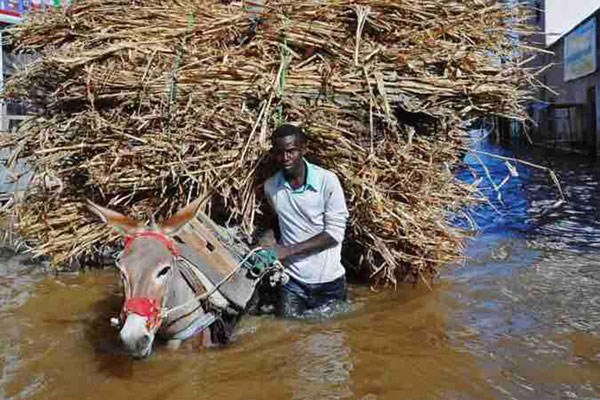
Thursday May 28, 2020

A man manning a donkey cart with dry maize stalks is stuck in the middle of flood waters in downtown Beledweyne, the capital of Hiran region in Hirshabelle State of Somalia, on 15 May 2020. PHOTO ABDULKADIR KHALIF NMG
Six months ago, Beledweyne, a town in central Somalia was battered by heavy rainstorms. The flooding destroyed houses, crops and roads, and displaced thousands of families.
Now, Beledweyne, the capital of the Hiiraan province in Hirshabelle, is once again submerged in flood water after River Shabelle burst its banks.
Hundreds have been displaced and hectares of farmland destroyed by the raging waters.
Beledweyne’s main marketplace, general hospital complex, town hall, headquarters of the Somali police force and other landmarks have been submerged.
Local administrators have erected temporary shelters at Jeento Kuundishe camping site.
Kassim Haji Yusuf, a long-time resident of the town with about 300,000 inhabitants, said two other major floodings in the area are etched in his memory.
“Beledweyne was the victim of major flooding by Shabelle River bursting its banks in 1961, just months after Somali regions gained independence from Italy and Britain in 1960,” he said. “The next big flooding was in 1981, exactly 20 years later.”
Mohamed Elmi, another native, accused local authorities for delayed response in mitigating the risks from overflowing nearby rivers.
Elmi said that over the last few decades, Shabelle River—almost unfilled during dry seasons—had flooded many times and that authorities should have acted long ago.
“The very strange development is that we have been experiencing either almost dry river bed or the watercourse bursting its banks,” remarked Elmi.
Haji Osman Dhagahow, the chairman of the anti-flooding committee in Beledweyne, said that sand should be removed from the aquifer.
“Since the collapse of the military government in Somalia led by the late General Mohamed Siad Barre and the country descended into civil war in 1991, the river bed has not been excavated and sand and soil deposits removed,” said Dhagahow.
Since the river is not very deep, “it is prone to flooding as the amount of water streaming through increases, especially during the rainy seasons,” he added.
Engineers and technicians from the Ministry of Public Works in Mogadishu say they need at least $6 million to excavate and build a canal that can deviate a significant amount of water before the river waters reaches the northern outskirts of the town.
On Sunday, Office for the Co-ordination of Humanitarian Affairs (Ocha) released a report indicating that twenty-five riverine villages had been submerged.
Ocha further warned that high to moderate flood risk along the Juba and Shabelle rivers is likely to persist this week due to continuing high flows from upper catchments.